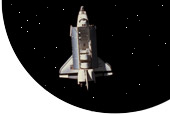Loading |
 |
|
||||||||||||||||||||||||||||||||||||||||||
| msnbc.com (Oberg): "Anxiety at NASA after Russian space chief replaced" Critical relationship already under strain http://msnbc.msn.com/id/4527950/ By James Oberg, NBC News space analyst HOUSTON - The pre-election shakeup of the Russian government extended into space last week, with Russian President Vladimir Putin appointing Col. Gen. Anatoly Perminov to head a streamlined space agency. The surprise move has NASA officials privately expressing concern, worried about the impact on U.S.-Russian space relations, already under strain due to the grounding of the U.S. space shuttle fleet. Until NASA's shuttles resume flying next year at the earliest, all crews and supplies are being transported to the international space station aboard Russian spacecraft. And if the station crew is ever to reach the long-promised level of six people, the Russians will have to double their launch rate –- although who is going to pay for this has remained a contentious topic during recent negotiations. Perminov may meet NASA Administrator Sean O’Keefe as early as April 1, during a previously scheduled visit to the United States.
Anxiety at NASA Over New Military Head of Russian Space Program James Oberg, NBC Space Consultant (link home page www.jamesoberg.com) photo of Perminov and Koptev is at Lo-res image of Perminov and Putin is at Formal military portrait of Perminov at Russian President Putin’s election shakeup of the Russian government has extended out into space, with the appointment of Colonel-General Anatoly Perminov to head a streamlined space agency. NASA officials are privately expressing concern about potential impacts on the US-Russian space partnership already under strain due to the grounding of the space shuttle fleet. Until space shuttles resume flying next year at the earliest, all crews and supplies are being transported aboard Russian spacecraft. And if the station crew is ever to reach the long-promised level of six people, the Russians will have to double their launch rate – although who is going to pay for this has remained a contentious topic during recent negotiations. Perminov may meet NASA Administrator O’Keefe as early as April 1, during an already-scheduled visit to the US. Late last week, Russia astonished the world space community with the announcement that the civil space agency – Rosaviakosmos, or the “Russian Aviation and Space Agency” – would be split into an aviation component and a space component – and a military officer would replace Yuriy Koptev, the current head of the space group. As veteran space journalist Konstantin Lantratov wrote in Friday’s ‘Kommersant-Daily’ newspaper, “The long-running dispute between the representatives of the civilian and military space exploration establishments as to who could make better use of available resources and develop the near-Earth space, has been resolved in favor of the latter.” The announcement of Koptev’s retirement caught many observers by surprise, there had been rumors in Moscow late last year that it was coming. Internet space journalist Nikolay Zhelaznyakov had written in December that “the Koptev era is ending” and that he would depart the agency “pretty soon”. But at that time, his successor was expected to be the agency’s first deputy director, Nikolay Moiseyev. A day after the announcement, Albert Condes, NASA’s newly-named Deputy Assistant Administrator for External Relations, circulated an internal memo late last week. MSNBC.com has obtained a copy of that document, entitled “Summary of Changes at Rosaviakosmos”. “It is likely that there will be additional fall-out for our relationship besides a change in the name and leadership of the agency,” Condes wrote. “While it is too early to tell what may come, it is clear that General Perminov is much less wedded to the human space flight program than Mr. Koptev.” Negotiations regarding who will pay for what aboard the re-directed International Space Station may also become more difficult, Condes warned. “Based on his reported comments as Commander of the Russian Space Forces, [he] is likely to take a more nationalistic perspective on Russia's space program. . . . The specific implications of this for current programs of cooperation should become more clear in the coming weeks.” Condes explained how this all had happened. “A Russian Presidential decree reduced the bureaucratic structure of the government from half a dozen Deputy Prime Ministers and 30 Ministries to 1 Deputy Prime Minister and 17 Ministries,” he wrote. “In general the new government is younger and more aligned with President Putin.” Of specific interest to NASA, continued Condes, “there are significant changes regarding Rosaviakosmos.” Furthermore, “Rosaviakosmos also lost the aviation part of its portfolio” – in recent years it had also been in charge of Russia’s aviation industry, whose budget dwarfed the funding allocated to space activities. “Although press reports on March 10, suggested that Mr. Koptev would retain his position at the head of the space agency,” Condes continued, “he was replaced on March 11 by General Colonel Anatolii Nikolaevich Perminov.” The actual rank is “Colonel-General”, one of the highest ‘flag officer’ ranks in the Russian armed forces. Perminov had been the Commander of the “Russian Space Forces”, which regained independent status in March 2001, when it was separated from the “Strategic Rocket Forces”. Condes explained that “there is a long history of bureaucratic conflict between the missileers and the folks who did other space-related duties in the Strategic Rocket Forces”. He did not mention that the “Military Space Forces” had already been a subunit of the missile forces since the early 1960’s, but had already briefly been an independent arm of the Ministry of Defense between 1992 and 1997. Perminov, 58, had been a missile officer since 1967, rising to the post of commander of Plesetsk space center north of Moscow. He served there from 1991 to 1993, and then in a variety of staff positions at the headquarters of the Strategic Rocket Forces Headquarters. He eventually became Chief of Staff and First Deputy Commander, and in 2001 was named to head the “Russian Space Forces” responsible for military satellites, space tracking and communications, missile attack warning, and anti-missile combat units around Moscow. The establishment of the ‘Space Troops’ in 2001, according to an article Perminov wrote for the Russian army daily ‘Red Star’ on March 13, 2002, “was necessitated by international trends toward the expansion of the role of space in providing protection for vitally important state interests in the economic, political, and military spheres.” He added that “the entire world” considered the use of space to be one of the main components of national security. “Only two countries, Russia and the United States, are capable of controlling space,” he told a Novosti reporter the following day. He described his main task as rebuilding the ‘orbital groupings’ of Russian military satellites, and moving all military space launchings from the Baykonur cosmodrome in Kazakhstan to sites within Russia. He also gave high priority to upgrading Russia’s anti-missile defense system, which “will become the basis for the protection of Russia’s national interests – and that is why its consistent modernization is planned.” In April 2003, Perminov had told a Russian journalist that carrying out his plans for developing the Space Forces was going to help Russia "retain the status of a great space power and maintain the balance of forces" in the world. Koptev was the first and to date the only head of the Russian Space Agency, a bureaucratic organization set up in post-Soviet Moscow to be the functional equivalent of the American space agency, NASA. The then NASA Administrator Daniel Goldin played a key role in Koptev’s acquisition of power over semi-independent space organizations in Russia, such as the Energia Space and Missile Organization that actually built and flew human space vehicles. Once Koptev took control of the flow of cash from foreign partners and from the federal government, he emerged as winner in a power struggle with Yuriy Semyonov of ‘Energia’. Koptev’s replacement, Perminov, had already planned to visit NASA. As Condes explained, another NASA official “had invited General Perminov to the US for a visit at the end of March/early April. That visit was to include a tour of Goddard Space Flight Center (on April 1) and a visit to Kennedy Space Center (on April 5). Given his sudden change of duties, General Perminov will probably change his travel plans - but if he doesn't, April 1 would be the perfect opportunity for a [bilateral discussion] with Mr. O'Keefe.” Perminov is not the first military flag officer to head a national space agency. US Navy Vice Admiral Richard Truly was NASA Administrator from 1989 to 1992. However, he had spent most of the previous quarter century as an astronaut, with few recent responsibilities in military space and missile activities.
|
home | profile | articles | books | lectures | jim speaks | humor
links | email
Copyright 2010 James Oberg. All Rights Reserved
Site Designed and Maintained by YoeYo.com
